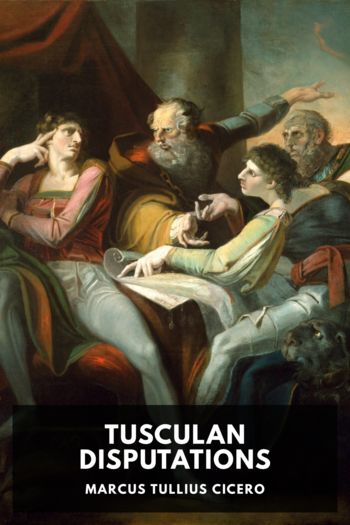Tusculan Disputations - Cicero (red novels TXT) 📗

- Author: Cicero
Book online «Tusculan Disputations - Cicero (red novels TXT) 📗». Author Cicero
Do you ask how it can? There are crowds of arguers who contradict this, and those not only Epicureans, whom I regard very little, but, somehow or other, almost every man of letters. And, above all, my favorite Dicaearchus is very strenuous in opposing the immortality of the soul, for he has written three books, which are entitled Lesbiacs because the discourse was held at Mitylene, in which he seeks to prove that souls are mortal. The Stoics, on the other hand, allow us as long a time for enjoyment as the life of a raven; they allow the soul to exist a great while, but are against its eternity.
Are you willing to hear then why, even allowing this, death cannot be an evil.
A. As you please. But no one shall drive me from my belief in mortality. M. I commend you, indeed, for that—though we should not be too confident in our belief of anything, for we are frequently disturbed by some subtle conclusion. We give way and change our opinions even in things that are more evident than this; for in this there certainly is some obscurity. Therefore, should anything of this kind happen, it is well to be on our guard. A. You are right in that, but I will provide against any accident. M. Have you any objection to our dismissing our friends the Stoics—those, I mean, who allow that the souls exist after they have left the body, but yet deny that they exist forever? A. We certainly may dismiss the consideration of those men who admit that which is the most difficult point in the whole question, namely, that a soul can exist independently of the body, and yet refuse to grant that which is not only very easy to believe, but which is even the natural consequence of the concession which they have made—that if they can exist for a length of time, they most likely do so forever. M.You take it right; that is the very thing. Shall we give, therefore, any credit to Pauaestius, when he dissents from his master, Plato? whom he everywhere calls divine, the wisest, the holiest of men, the Homer of philosophers, and whom he opposes in nothing except this single opinion of the soul’s immortality: for he maintains what nobody denies, that everything which has been generated will perish, and that even souls are generated, which he thinks appears from their resemblance to those of the men who begot them; for that likeness is as apparent in the turn of their minds as in their bodies. But he brings another reason—that there is nothing which is sensible of pain which is not also liable to disease; but whatever is liable to disease must be liable to death. The soul is sensible of pain, therefore it is liable to perish.
These arguments may be refuted. For they proceed from his not knowing that, while discussing the subject of the immortality of the soul, he is speaking of the intellect, which is free from all turbid motion, but not of those parts of the mind in which those disorders anger and lust have their seat, and which he whom he is opposing, when he argues thus, imagines to be distinct and separate from the mind. Now this resemblance is more remarkable in beasts, whose souls are void of reason. But the likeness in men consists more in the configuration of the bodies: and it is of no little consequence in what bodies the soul is lodged, for there are many things which depend on the body that give an edge to the soul; many which blunt it. Aristotle, indeed, says that all men of great genius are melancholy, so that I should not





Comments (0)